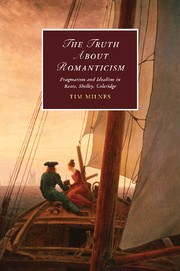Book contents
- Frontmatter
- Contents
- Acknowledgements
- Introduction: The pragmatics of romantic idealism
- 1 Romanticising pragmatism: dialogue and critical method
- 2 Pragmatising romanticism: radical empiricism from Reid to Rorty
- 3 This living Keats: truth, deixis, and correspondence
- 4 An unremitting interchange: Shelley, elenchus, and the education of error
- 5 The embodiment of reason: Coleridge on language, logic, and ethics
- Conclusion
- Notes
- Bibliography
- Index
- CAMBRIDGE STUDIES IN ROMANTICISM
4 - An unremitting interchange: Shelley, elenchus, and the education of error
Published online by Cambridge University Press: 06 July 2010
- Frontmatter
- Contents
- Acknowledgements
- Introduction: The pragmatics of romantic idealism
- 1 Romanticising pragmatism: dialogue and critical method
- 2 Pragmatising romanticism: radical empiricism from Reid to Rorty
- 3 This living Keats: truth, deixis, and correspondence
- 4 An unremitting interchange: Shelley, elenchus, and the education of error
- 5 The embodiment of reason: Coleridge on language, logic, and ethics
- Conclusion
- Notes
- Bibliography
- Index
- CAMBRIDGE STUDIES IN ROMANTICISM
Summary
Writing ‘On Life’ in Florence in late 1819, Shelley disavows the dogmatic materialism of his youth and, encouraged by the diverse lessons of Hume, Drummond, and Tooke, together with over a year's intensive reading of Plato, outlines an approach to experience and reality altogether less grounded and logocentric:
Whatever may be his [man's] true and final destination, there is a spirit within him at enmity with nothingness and dissolution. This is the character of all life and being. Each is at once the centre and the circumference; the point to which all things are referred, and the line in which all things are contained. … Philosophy, impatient as it may be to build, has much work yet remaining …. It reduces the mind to that freedom in which it would have acted, but for the misuse of words and signs, the instruments of its own creation…. Our whole life is thus an education of error.
On one hand, this passage appears strikingly performative. Shelley's own writing, the self-consciously rhetorical use (rather than ‘misuse’) of words and signs, might itself be seen as an ‘education of error’. Remarkably tenacious in this centrifugal action, however, is the centripetal function of philosophy, which has ‘much work yet remaining’ in monitoring the relationship between the ‘centre’ and ‘circumference’ of human life.
- Type
- Chapter
- Information
- The Truth about RomanticismPragmatism and Idealism in Keats, Shelley, Coleridge, pp. 105 - 144Publisher: Cambridge University PressPrint publication year: 2010
- 1
- Cited by

